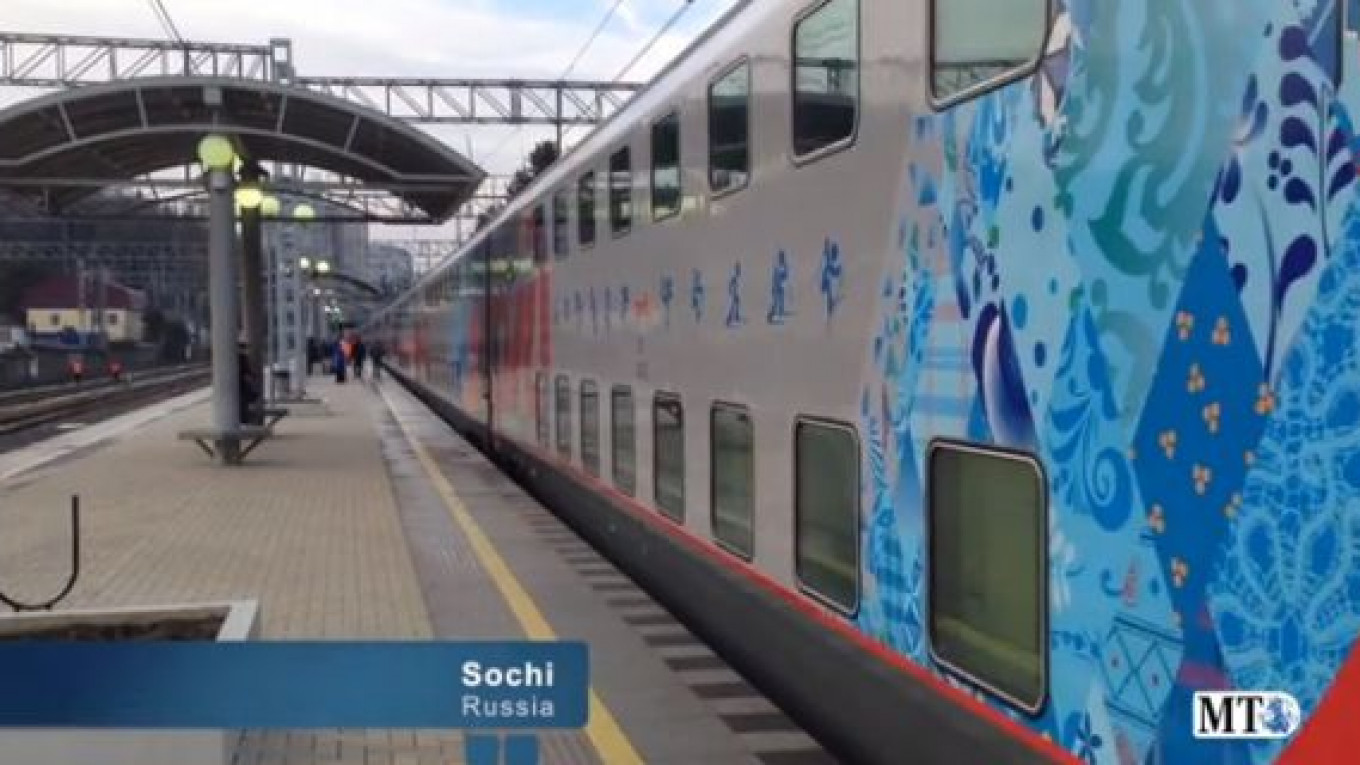ON THE TRAIN BETWEEN MOSCOW AND SOCHI — Only one thing seems to be on the minds of passengers traveling the brand-new double-decker train between Moscow and Sochi — the upcoming Winter Olympics.
"It is all just for . There is no real meaning in this Olympics," said Nikolai Rogov, a train driver who was being sent by Russian Railways to its Sochi sanatorium for a vacation.
He and other passengers reiterated a common belief among many Russians that much of the $50 billion that the federal government earmarked for the Olympics had been stolen and that facilities built for the event were shoddy and at risk of falling apart shortly after the Games end.
Russian Railways, the state-owned rail monopoly, certainly hopes the prediction doesn't apply to the special double-decker train, which it launched in November. I hopped on board for the 23-hour trip so I could finish establishing a Moscow Times bureau in Sochi ahead of the opening of the Olympics on Feb. 7.
The train, which will continue to run after the Games, is touted by Russian Railways as a more comfortable and less expensive travel experience than its standard trains. With two-story cars, the train can carry twice as many passengers, making it cheaper for the railroad company. A one-way ticket costs 3,620 rubles ($105), about 20 percent less than the regular fare.
The other advantages of the train are less apparent. In a nod toward the environment, separate waste disposable bins for paper, glass and other recyclables were installed in my train car. But beside the polished chrome recycle bins stood a single cardboard box into which all passengers tossed their waste.
The onboard wireless network only worked within Moscow city limits. My neighbor in the train compartment, Dmitry Vashenko, commented on this philosophically. "There is clearly no life beyond the Moscow Ring Road," he said, referring to a colloquial phrase in Russia that describes stark contrasts between the capital city and its periphery.
Our conversation quickly turned to the Olympics. Vashenko, in an apparent attempt to demonstrate his personal prestige and clout, told me that he had first-hand information that President Vladimir Putin would shake up the government after the Games, replacing Prime Minister Dmitry Medvedev with Federation Council Speaker Valentina Matviyenko, Defense Minister Sergei Shoigu or former Finance Minister Alexei Kudrin.
"Everything is going to change after the Games. We will see another attempt to reincarnate the Soviet Union," said Vashenko, who works as a business coach for various Western companies.
Sergei Naidyonov, a hip-looking young man from Voronezh, was traveling back to work on the ski slopes of Krasnaya Polyana. He is a snowmobile driver for VIP guests at the Laura ski resort, Putin's favorite skiing destination. The resort, owned by the state gas monopoly Gazprom, will serve as a ski and biathlon stadium during the games.
Naidyonov shared stories about how he has escorted Prime Minister Dmitry Medvedev and other dignitaries when they ski at Laura. Once, he said, he mistook Medvedev's wife, Svetlana, for a regular tourist and, when Medvedeva came to him with a request for snowmobile ride, he bluntly turned her down.
He managed to keep his job.
"I just didn't recognize her!" Nidyonov said with a grin. "I like to ski, and I don't care about politics."
Contact the author at i.nechepurenko@imedia.ru
A Message from The Moscow Times:
Dear readers,
We are facing unprecedented challenges. Russia's Prosecutor General's Office has designated The Moscow Times as an "undesirable" organization, criminalizing our work and putting our staff at risk of prosecution. This follows our earlier unjust labeling as a "foreign agent."
These actions are direct attempts to silence independent journalism in Russia. The authorities claim our work "discredits the decisions of the Russian leadership." We see things differently: we strive to provide accurate, unbiased reporting on Russia.
We, the journalists of The Moscow Times, refuse to be silenced. But to continue our work, we need your help.
Your support, no matter how small, makes a world of difference. If you can, please support us monthly starting from just $2. It's quick to set up, and every contribution makes a significant impact.
By supporting The Moscow Times, you're defending open, independent journalism in the face of repression. Thank you for standing with us.
Remind me later.






